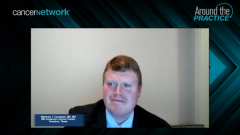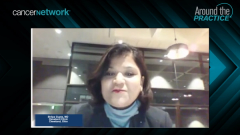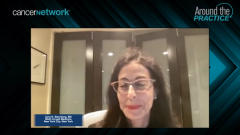
Metastatic Urothelial Carcinoma: Optimizing Frontline Maintenance Therapy
Shared insight on best practices in frontline maintenance therapy for metastatic urothelial carcinoma to improve patient outcomes.
Episodes in this series

Transcript:
Peter H. O’Donnell, MD, PhD: Let me ask a follow-up maybe back to Shilpa here. You're starting your gemcitabine platinum in this patient. How many cycles are you trying to get this patient through before you switch maintenance?
Shilpa Gupta, MD: Peter, that’s a great question. My practice was to try to get to 6 cycles if patients are tolerating well. Based on the recent data we saw that 4 cycles followed by maintenance is as good as 6 cycles. I’m now trying to lead with chemotherapy and switch to maintenance after 4 cycles and don’t necessarily feel compelled to give 6 cycles.
Peter H. O’Donnell, MD, PhD: Cora, can I ask you, do you take a little break after the platinum before you start the immunotherapy maintenance, or what’s the duration of time?
Cora N. Sternberg, MD: I still try to give 6 cycles of chemotherapy in a patient with metastatic disease if I can. I think the data—whenever you go back and do retrospective analyses that weren’t prespecified 4 cycles vs 5 cycles vs 6 cycles—it looked like the 6 did a little bit better than the 4 but not so much better. I understand completely what you’re saying, but I still try to give 6 cycles if the patient is tolerating the chemotherapy well. When we did the trial, we had patients who had stable disease, PR [partial response] or CR [complete response], and we waited 4 to 10 weeks but that’s usually meant that we repeated the CT [computed tomography] scans to see where we were to make sure that we really had a PR or a CR stable disease and then the patients were randomized between avelumab [Bavencio] or a supportive care alone. I usually wait. I don’t start immediately the second that they finish the chemotherapy.
Peter H. O’Donnell, MD, PhD: So you’re giving them 4 to 6 weeks or something like that?
Cora N. Sternberg, MD: More or less. That’s the way that the trial was done. Yes.
Peter H. O’Donnell, MD, PhD: And are you definitely using avelumab maybe …
Cora N. Sternberg, MD: It was 4 to 10 weeks [in the trial], but I give it 4 to 6 weeks.
Peter H. O’Donnell, MD, PhD: Are you definitely using avelumab? I hear some community oncologists asking, “Well, could we use any immunotherapy as a maintenance?”
Cora N. Sternberg, MD: Yes, that’s the problem. I’m definitely using avelumab and that’s what the NCCN [National Comprehensive Cancer Network] guidelines and the ESMO [European Society for Medical Oncology] guidelines and the AUA [American Urological Association] guidelines and the EAU [European Association of Urology] guidelines suggest on level 1 evidence. The only other trial we have is a very small trial. That was a phase 2 randomized trial with 100 patients using pembrolizumab [Keytruda] and there was a cross over. They weren’t even trying to look at overall survival. They saw an improvement in progression free survival with 50 patients in each arm. So, in some countries, they’ll say, “We don’t have avelumab. Can’t we just use pembrolizumab? That’s what we have.” And I don’t know what to tell them. They don’t have it but we don’t really have the level 1 evidence to use it. So, working in the United States, I feel I should be using avelumab. I think that’s what’s going into the guidelines all over the world at the moment.
Peter H. O’Donnell, MD, PhD: One of the questions we’re getting from the audience around this, we only presented options with gemcitabine and platinum, would there be a particular type of patient? And maybe Matt, I don’t know, you can take this one. Would there be a particular type of patient where you would use MVAC [methotrexate, vinblastine sulfate, doxorubicin hydrochloride (Adriamycin), and cisplatin]?
Matthew T. Campbell, MD, MS: Yes. I know the class of MVAC vs gemcitabine and platinum felt like they were near equivalents between the 2 regimens. But I do think in patients that are relatively physiologically young and fit and have aggressive disease, we certainly will consider offering them MVAC in this setting and push the 4 and 6 cycles depending on response and tolerability. But my sense is the presence of MVAC in the modern era is not too dissimilar in terms of tolerance as compared to gemcitabine cisplatin.
Cora N. Sternberg, MD: When we were first designing the JAVELIN trial, I was begging them to also put MVAC into the regimen, but whatever I didn’t get my way. They only wanted to have 1 kind of a regimen so it didn’t get in there. But if you look at the NCCN guidelines, the NCCN guidelines say gemcitabine plus a platinum, or carboplatin, or dose-dense MVAC. I don’t even say MVAC. I don’t know where that came out of me. The guidelines are done by voting.I think most people think that combinations, platinum-based chemotherapy is to be used and then followed by avelumab maintenance based on those guidelines.
Peter H. O’Donnell, MD, PhD: Cora, maybe I’ll ask you this follow-up too from what we’re getting from the audience here because it is a little bit of a blast from the past. If you’re using cisplatin at full dose, do you also use mannitol?
Cora N. Sternberg, MD: Mannitol? Not recently. I don’t think I’ve used that in a long time. We used to use it. We used to give people Valium [diazepam] and put them to sleep for 2 days also when they got the first MVAC chemotherapy. Then they used to throw up all over us because we didn’t even have the right medicines. Things have changed a lot since then.
Matthew T. Campbell, MD, MS: It’s still, unfortunately, that, I don’t want to say unfortunately, but it’s on our order sets. But I do suggest if they’ve already considered it at the end substitute normally.
Peter H. O’Donnell, MD, PhD: Shilpa, maybe I’ll ask you this one. Again, about that choice of the frontline platinum drug. One of the questions we got from the audience was, if you’re given avelumab maintenance anyway, if you’re going to give the avelumab maintenance, is it OK to just use gemcitabine with carboplatin even if the patient is cisplatin eligible? Aren’t the outcomes going to be similar?
Shilpa Gupta, MD: Well, I would say no to what Cora said earlier. We know that unlike lung cancer in urothelial cancer cisplatin is certainly better. Although, Peter, the recent phase 3 trials are showing the better outcomes that carboplatin has with historically part of median overall survival of 9 months or so. But in the recent trials, we’ve seen around 12 to 13 months. But when possible, I push for cisplatin and I don’t follow the traditional criteria of creatinine clearance of 60. Fifty is really a very acceptable threshold with those. So yes, I would say if a patient is cisplatin eligible, I go for cisplatin and not carboplatin.
Peter H. O’Donnell, MD, PhD: Matt, do you concur?
Matthew T. Campbell, MD, MS: Yes. I would just like to chime into the JAVELIN [Bladder] 100. The only patients that were randomized were the ones that had at least stable disease. So you do have a higher average drop rate with carboplatin as compared to cisplatin. I think that cisplatin is more active in this disease and if patients are eligible, they could use cisplatin.
Cora N. Sternberg, MD: What you’re saying is correct. We chose the best patients. I don’t know if the stable disease are necessarily the best patients but we didn’t choose patients who progressed. That’s for sure.
Transcript edited for clarity.
Newsletter
Stay up to date on recent advances in the multidisciplinary approach to cancer.












































